Joel Millman
- 1995
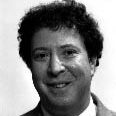
Fellowship Title:
- Middle Class: African and Caribbean Emigrants and Their Role in Rebuilding Urban America
Fellowship Year:
- 1995
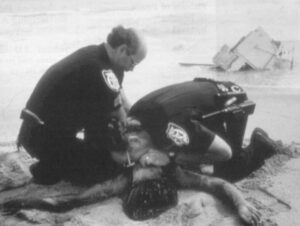
Delray Beach, Florida: Little Haiti’s Little Sister
Note: Many of the Pictures used in the original APF Reporter issue are copyrighted and could not be used in the web eddition Daniella Henry remembers her first visit to Delray Beach. Driving up from Miami one night in 1990, she exited brightly-lit Interstate 95 for Atlantic Avenue, the town’s main drag. She was delighted to see streets filled with people in a festive mood, despite the late hour. “I thought it was a carnival,” she says, her natural smile brightening. Delight quickly turned to horror: “No carnival. Drugs.” Delray Beach in 1990 was a notorious crack zone. Tourists bypassed the Palm Beach County town on their way to Fort Lauderdale and Miami, but locals would dart in out to score drugs. Most other downtown businesses fled, leaving a tax base dependent on winter snow-birds from Michigan or New York, and widows living in bungalows or retirement homes. A redneck power structure enforced a tradition of segregation, a breeding ground for civic corruption. “The police chief collected rent on Friday nights,” recalls Virginia Snyder, a
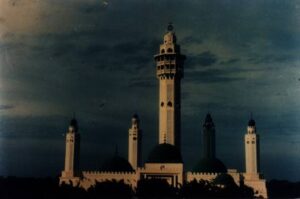
Profiting from One’s Prayers
When prayers end, commerce begins. It’s an inevitable consequence when you are part of a sea of worshippers flowing from West Africa’s holiest shrine. This is the only known photo of Cheikh Ahmadou Bamba, the founder of Senegal’s Mouride Brotherhood. It was taken in the early 1900s outside the prophet’s home in Djourbel. Today, his cult spreads across West Africa to Europe and the United States. His image is ubiquitous in Senegal and increasingly in some black sections of the United States. The Great Mosque of Touba, 200 kilometers east of Dakar, Senegal, opens on a plaza. The plaza faces a casbah, an enormous maze of street vendors, pushcarts and canvas stalls stretching like a tent city into the desert. Falilou Mbacke ruled as Khalifa-General, the spiritual leader of the Mourides, from 1945 until his death in 1968. The oldest son of Ahmadou Bamba, the marabout effectively consolidated hereditary rule within Mouridism, which continues to the present. The mosque is Ground Zero for a Muslim sect called the Mouride Brotherhood. First in Senegal, then throughout
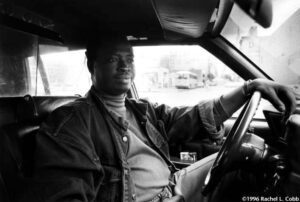
Caste Party: Africa Arrives in America
The United Gnegnos of America held their annual ball recently at the Bronx’s Parkside Plaza. Gnegnos (pronounced “NYE nyose”) are a caste, actually the lowest caste, among the city’s 20,000-odd Senegalese immigrants. To attend a Gnegnos function, to have even heard of it (I received an engraved invitation with the afternoon mail) is to note the critical mass of settlement that Senegal has brought to New York. And that is worth celebrating. The soul of the new ghetto lies in service workers like Mourtala Sall and his wife. He drives taxis six nights a week, and she cares for their two-year-old daughter while earning up to $50 an hour braiding hair for African-American women in their kitchens. They are saving to open a Senegalese restaurant, the first one, Mourtala hopes, to cross out of Harlem and into middle-class Manhattan. “Americans like our food,” Mourtala says. “But white people won’t go to Harlem.” Amid vintage Outer Borough, folding-chairs decor, a DJ pumps an Original Homeboy beat from a plexiglass booth. Striking women arrive wearing peach and
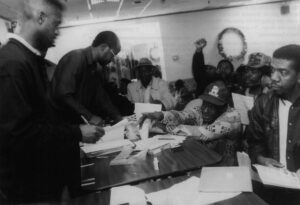
Brooklyn’s Anti-Poverty Workers: Caribbean Immigrants
Family values, religion and community renewal are among the pillars of conservative ideology, and rallying-points of Republican legislators who tend to represent districts that are rural, white and affluent. In Democratic Brooklyn, particularly the mainly black, mainly poor neighborhood called Fort Greene, the Republican Personal Responsibility Act is mere Beltway Speak for policy that has been evolving for decades. The Jamaica Progressive League attracted more than 300 people in a new voter/citizens drive held a Guayanan retaurant in Brooklyn’s Flatbush section this March. Would-be citizens paid $120 each for photographs, fingerprints and notarized registration forms. The first citizens will be sworn in this summer. Photo by Rachel L. Cobb The PRA, which would evict legal immigrants from welfare rolls and other federally-funded anti-poverty programs, will have little impact on the parents of children at the Hanson Place School. Hanson Place celebrates its thirtieth anniversary this year. Since 1965 it has moved from the basement of a former Jewish synagogue to a six-story building at the corner of Lafayette Avenue and St. Felix Street, in what
